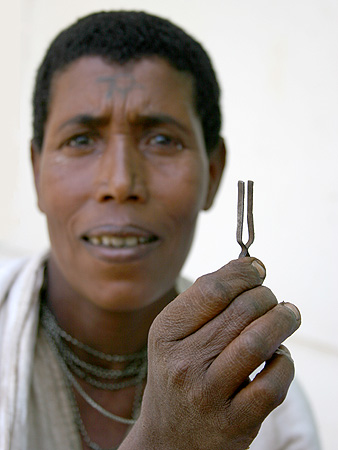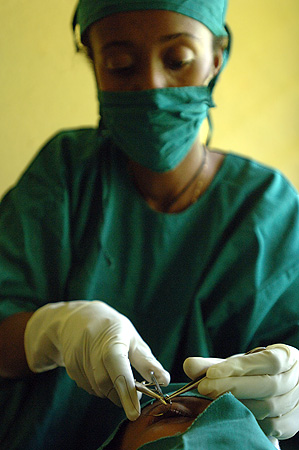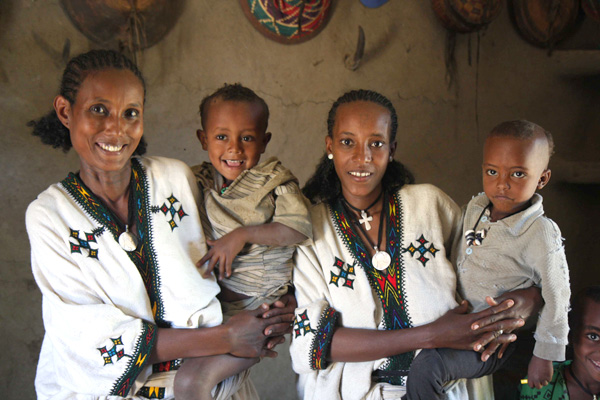Use becomes more rare as Center, partners make major strides against the disease.
The wishbone-like tweezers, folded from pieces of tin cans, look like a charm or pendant, but have a gruesome purpose. In a desperate measure to find relief from the agony of advanced-stage trachoma — during which a person’s eyelashes turn inward, scraping the cornea with every excruciating blink — people use the crude tweezers or forceps to pull out their own eyelashes.

A woman holds up a pair of tweezers, fashioned from a food can and worn around her neck. These tweezers are becoming rarer in Amhara Region, Ethiopia, thanks to the hard work of The Carter Center and its partners to stop the blinding disease trachoma. (Photo Credit: The Carter Center/P. Emerson)
The world’s leading cause of preventable blindness, trachoma spreads easily from person to person, mostly affecting children. Women, as traditional caretakers of children, are repeatedly exposed to the disease, and as a result, are almost twice as likely as men to go blind from the advanced stage of trachoma – trichiasis. Sunlight, smoke from cooking fires, and dust aggravate trichiasis, making even the most basic of necessary tasks – such as cooking or gathering water – impossibly painful for a sufferer.
The Carter Center, in partnership with the ministries of health and others, works in six African countries to eliminate blinding trachoma through a series of World Health Organization-approved interventions called the SAFE strategy. The SAFE strategy has been instrumental in helping Ghana become the first sub-Saharan African nation to eliminate blinding trachoma as a public health problem.
“Trachoma destroys the lives of its victims and their families, many of whom already live at the edge of survival” said Dr. Paul Emerson, director of the Carter Center’s Trachoma Control Program. “Women, particularly, are ostracized from their communities and can be cruelly ridiculed by their families and friends for being unable to care for themselves. Fortunately, we have the tools to stop this disease for good, and we’re making major progress.”
Experts hope that one day Ethiopia also can wipe out blinding trachoma, but the nation faces a heroic task. The Amhara Region is one of the most severely trachoma-endemic areas of the world, with more than 18 million people at risk. The lack of roads and access to basic health care further complicate disease prevention activities.
Yet, close collaborations on the ground with local communities have inspired innovative outreach programs mobilizing millions of people, and large-scale surgery campaigns are helping to address the backlog of nearly half a million patients in immediate need of surgery to prevent blindness from trachoma.

The advanced stage of trachoma, trichiasis is the inward turning of eyelashes. Trichiasis causes extraordinary pain and discomfort to the sufferer and eventually leads to blindness. In 2011, with Carter Center support, local trained health workers conducted more than 39,000 surgeries in patients at immediate risk of blindness to preserve their sight. (Photo Credit: The Carter Center/V. Vick)
As a result of these hard-won efforts, last year alone more than 14 million doses of the antibiotic Zithromax® (azithromycin, donated by Pfizer Inc.) were distributed in Amhara to treat active trachoma infections; more than 39,000 surgeries were conducted to prevent blindness; more than 284,000 latrines were built to improve environmental sanitation; and health education was routinely conducted in more than 3,400 villages to prevent the disease.
“If we see fewer people wearing tweezers, it means fewer people need them because of trachoma, and, aside from the other data we collect in the field, this is supporting evidence that our interventions to fight this dreadful disease are working,” said Dr. Emerson.

Two young mothers in Amhara practice good facial hygiene and other trachoma interventions to keep their families healthy. They are among millions of recipients of health education, antibiotic distribution, and other services provided each year in their region with support from The Carter Center. (Photo Credit: The Carter Center/P. Emerson)
Learn more about the Carter Center’s work to fight trachoma >
Learn more about the Carter Center’s Health Work in Ethiopia >
Watch the video: Women and Trachoma >
Read the feature: Return Visit Confirms Family’s Continued Vigilance Against Trachoma >
Read the Q&A with Dr. Paul Emerson: Maltra Success Measured in Millions >
Please sign up below for important news about the work of The Carter Center and special event invitations.